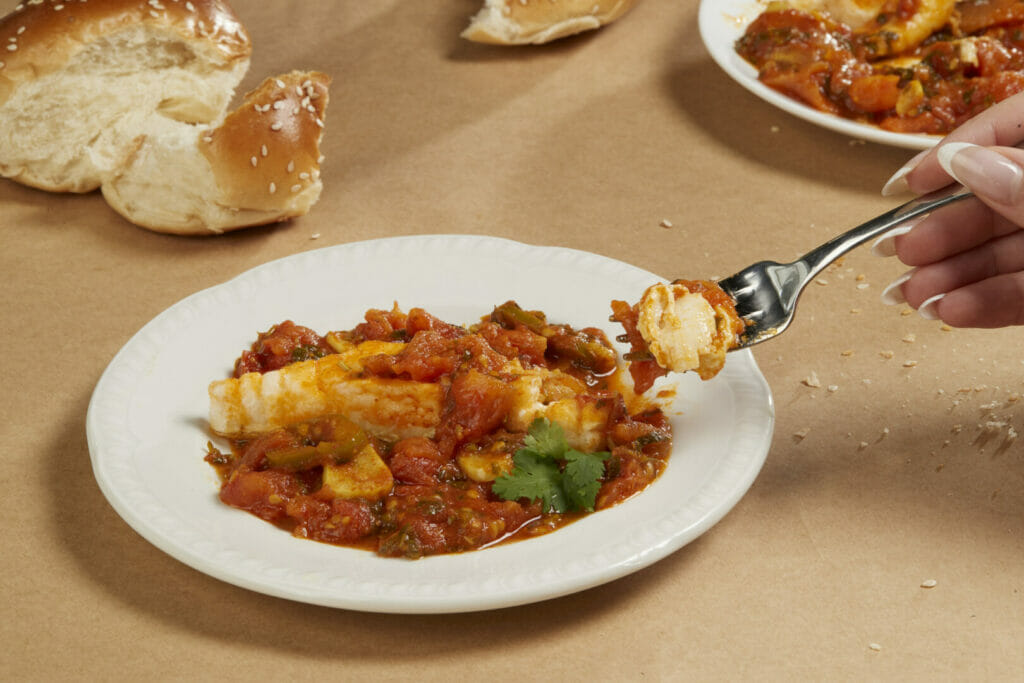The following report is a press release by Steakholder Foods:
Steakholder Foods Ltd. (NASDAQ: STKH), an international deep tech food company at the forefront of the cultivated meat industry, announced that it has successfully printed the first ready-to-cook cultivated grouper fish product. As part of the strategic partnership between the two companies, Steakholder Foods customized its bio-inks utilizing grouper cells provided by Umami Meats Pte Ltd.
To celebrate this achievement, Steakholder Foods hosted Mihir Pershad (CEO of Umami Meats), Arik Kaufman (CEO of Steakholder Foods), Megumi Avigail Yoshitomi (Japan Association for Cellular Agriculture), and Adele Li (Chargée d’ Affaires at the Embassy of the Republic of Singapore in Israel) at a tasting event in its Israel facilities. The tasting included a “grouper fish chef’s table”, with piscine delicacies prepared by the Company’s chef, Moran Lidor, including Singaporean-style and Israeli-style signature fish dishes. The event came hot on the heels of the visit of the Israeli Prime Minister, who also watched the fish being printed firsthand and tasted the prototype, becoming the first Prime Minister ever to taste 3D-printed cultivated fish.
The printing and bio-ink customization are steps on the path to commercializing Steakholder Foods’ 3D printer, proving its bioprinting and bioink technologies to be a sophisticated production platform for structured hybrid and cultivated products, that can facilitate various species and therefore various companies and industry players.
SEE: Japan Unveils First Ever 3D-Printed Wagyu-Beef Steak
The collaboration with Umami Meats, which is backed by a grant from the Singapore-Israel Industrial R&D Foundation, aims to develop a scalable process for producing structured cultivated fish products using Steakholder Foods’ proprietary 3D bio-printing technology and customized bio-inks.

Since receiving grouper fish cells from Umami, the Steakholder Foods team has been hard at work creating customized bio-inks and optimizing the taste and texture of its printed grouper, towards finalizing a prototype. The 3D fish printing represents a successful and meaningful milestone in the partnership between Umami Meats and Steakholder Foods.
Unlike fully cultivated meat products which still require incubation and maturation after printing, the grouper fish product is ready to cook after printing, thanks to Steakholder Foods’ unique technology that allows the mimicking of the flaky texture of cooked fish – a technology that is the subject of a provisional patent application.
We’re excited to be working with Umami Meats to develop 3D-printed structured fish products that have the same great taste and texture as traditionally caught fish, without harming the environment. With an estimated size of $110 billion and projected growth of 3-4% annually in the near future, the seafood and fish market is a long-time part of our vision for introducing sustainable solutions that increase food security.
Having created a customized bio-ink that works effectively with Umami’s cells and optimized the taste and texture to meet the high standards of consumers, we anticipate expanding our collaborations to a greater variety of species with additional partners.
Arik Kaufman, CEO of Steakholder Foods
SEE: Israel-Based Company Launches World’s First Ever Plant-Based Salmon
We are delighted to have produced the world’s first whole fillet cultivated fish in partnership with Steakholder Foods. In this first tasting, we showcased a cultivated product that flakes, tastes, and melts in your mouth exactly like excellent fish should.
In the coming months, we intend to announce our plans for bringing this world-class cultivated fish to the market.
Mihir Pershad, CEO of Umami Meats
SEE: Israel Approves Country’s First Vegan Precision Fermentation Dairy
AUTHOR COMMENTARY
It should also be noted that Steakholder Foods has a membership in the UN Global Compact, and is working to help meet the United Nations Sustainable Development Goals (SDGs), by “strengthening food security, decreasing carbon footprint, and conserving water and land resources,” the company claims.
Again, this is all a load of mumbo jumbo in quest to reduce carbon emissions, which are just a load of made-up nonsense as far as am I concerned – statistics these people just create out of thin-air, not actually based on any real science. Just eat the real thing, not these synthesized chemicals bombs, that have absolutely zero long term studies on their health and affects on the body.
[1] Now the Spirit speaketh expressly, that in the latter times some shall depart from the faith, giving heed to seducing spirits, and doctrines of devils; [2] Speaking lies in hypocrisy; having their conscience seared with a hot iron; [3] Forbidding to marry, and commanding to abstain from meats, which God hath created to be received with thanksgiving of them which believe and know the truth. 1 Timothy 4:1-3
[7] Who goeth a warfare any time at his own charges? who planteth a vineyard, and eateth not of the fruit thereof? or who feedeth a flock, and eateth not of the milk of the flock? [8] Say I these things as a man? or saith not the law the same also? [9] For it is written in the law of Moses, Thou shalt not muzzle the mouth of the ox that treadeth out the corn. Doth God take care for oxen? [10] Or saith he it altogether for our sakes? For our sakes, no doubt, this is written: that he that ploweth should plow in hope; and that he that thresheth in hope should be partaker of his hope. (1 Corinthians 9:7-10).
The WinePress needs your support! If God has laid it on your heart to want to contribute, please prayerfully consider donating to this ministry. If you cannot gift a monetary donation, then please donate your fervent prayers to keep this ministry going! Thank you and may God bless you.







